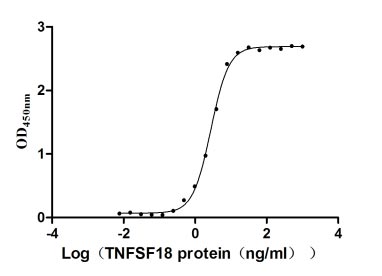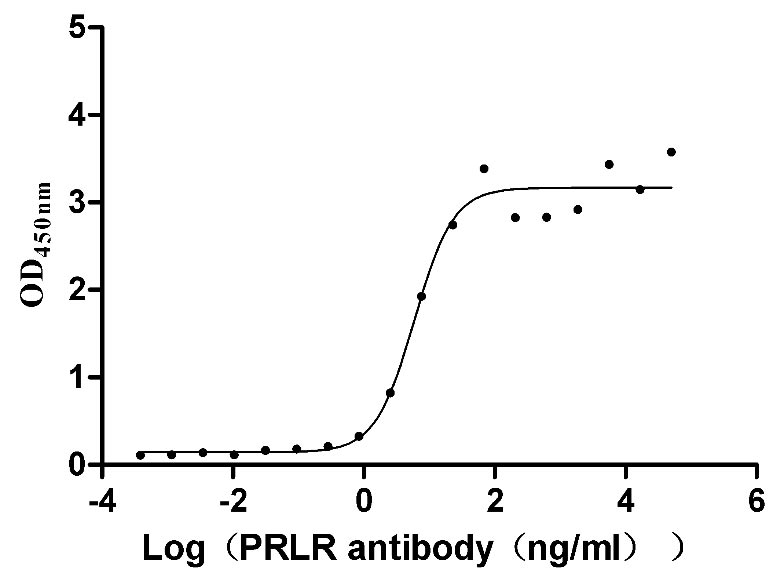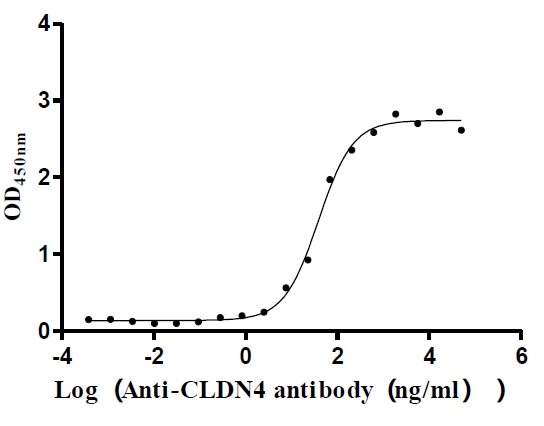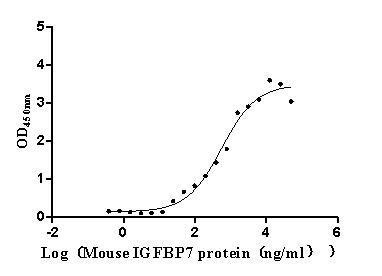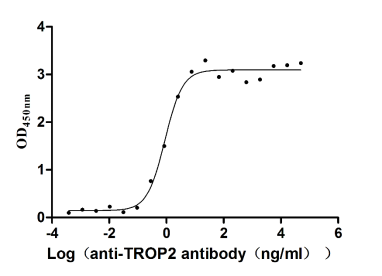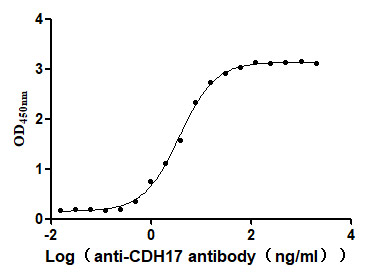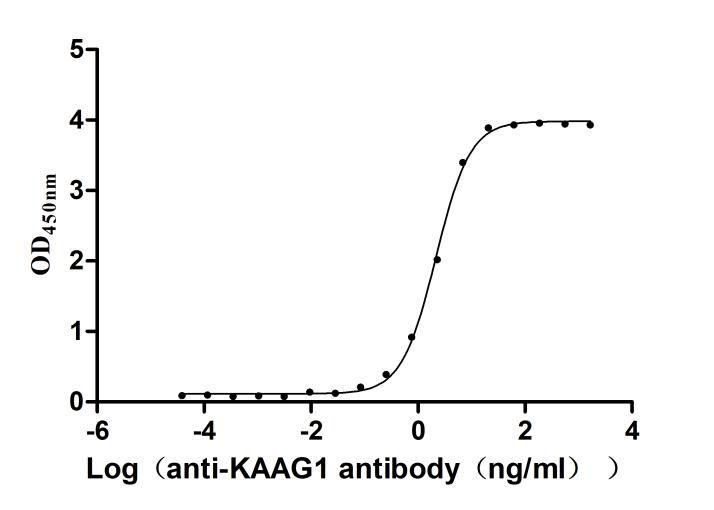Recombinant Human Leukocyte immunoglobulin-like receptor subfamily B member 4 (LILRB4), partial
-
货号:CSB-YP850914HU
-
规格:
-
来源:Yeast
-
其他:
-
货号:CSB-EP850914HU
-
规格:
-
来源:E.coli
-
其他:
-
货号:CSB-EP850914HU-B
-
规格:
-
来源:E.coli
-
共轭:Avi-tag Biotinylated
E. coli biotin ligase (BirA) is highly specific in covalently attaching biotin to the 15 amino acid AviTag peptide. This recombinant protein was biotinylated in vivo by AviTag-BirA technology, which method is BriA catalyzes amide linkage between the biotin and the specific lysine of the AviTag.
-
其他:
-
货号:CSB-BP850914HU
-
规格:
-
来源:Baculovirus
-
其他:
-
货号:CSB-MP850914HU
-
规格:
-
来源:Mammalian cell
-
其他:
产品详情
-
纯度:>85% (SDS-PAGE)
-
基因名:
-
Uniprot No.:
-
别名:CD85 antigen-like family member K; CD85k; HM18; ILT-3; ILT3; Immunoglobulin-like transcript 3; Leukocyte immunoglobulin like receptor subfamily B (with TM and ITIM domains) member 4; Leukocyte immunoglobulin-like receptor 5; Leukocyte immunoglobulin-like receptor subfamily B member 4; LILRB4; LILRB5; LIR-5; LIR5; LIRB4_HUMAN; Monocyte inhibitory receptor HM18
-
种属:Homo sapiens (Human)
-
蛋白长度:Partial
-
蛋白标签:Tag type will be determined during the manufacturing process.
The tag type will be determined during production process. If you have specified tag type, please tell us and we will develop the specified tag preferentially. -
产品提供形式:Lyophilized powder
Note: We will preferentially ship the format that we have in stock, however, if you have any special requirement for the format, please remark your requirement when placing the order, we will prepare according to your demand. -
复溶:We recommend that this vial be briefly centrifuged prior to opening to bring the contents to the bottom. Please reconstitute protein in deionized sterile water to a concentration of 0.1-1.0 mg/mL.We recommend to add 5-50% of glycerol (final concentration) and aliquot for long-term storage at -20℃/-80℃. Our default final concentration of glycerol is 50%. Customers could use it as reference.
-
储存条件:Store at -20°C/-80°C upon receipt, aliquoting is necessary for mutiple use. Avoid repeated freeze-thaw cycles.
-
保质期:The shelf life is related to many factors, storage state, buffer ingredients, storage temperature and the stability of the protein itself.
Generally, the shelf life of liquid form is 6 months at -20°C/-80°C. The shelf life of lyophilized form is 12 months at -20°C/-80°C. -
货期:Delivery time may differ from different purchasing way or location, please kindly consult your local distributors for specific delivery time.Note: All of our proteins are default shipped with normal blue ice packs, if you request to ship with dry ice, please communicate with us in advance and extra fees will be charged.
-
注意事项:Repeated freezing and thawing is not recommended. Store working aliquots at 4°C for up to one week.
-
Datasheet :Please contact us to get it.
相关产品
靶点详情
-
功能:Receptor for class I MHC antigens. Recognizes a broad spectrum of HLA-A, HLA-B, HLA-C and HLA-G alleles. Involved in the down-regulation of the immune response and the development of tolerance, e.g. towards transplants. Interferes with TNFRSF5-signaling and NF-kappa-B up-regulation. Inhibits receptor-mediated phosphorylation of cellular proteins and mobilization of intracellular calcium ions.
-
基因功能参考文献:
- Results suggest that ILT3 played an important role in tumor progression in colorectal cancer by possible influence on CD45RO+ T cells in the tumor microenvironment. PMID: 30126665
- These results suggest that tyrosine phosphorylation may be critical in FcgammaRI-dependent endocytosis/phagocytosis that may be regulated by LILRB4 by triggering dephosphorylation of key signalling proteins. PMID: 27725776
- ILT3 may functionally contribute to a regulatory network controlling tumor progression by suppressing the Akt pathway. PMID: 28931525
- The ILT3 PBs/PCs were suggested to be developmentally equivalent based on the simultaneous generation of these populations upon activation of memory B cells in vitro ILT3 expression was found to be induced efficiently by IL-2, while IFN-alpha effectively induced ILT3 PBs/PCs in vitro Utilizing the elevated ILT3 will support opening a new avenue for molecular markers for, pathogenic cells. PMID: 27742834
- this study shows that LILRB4 might have dual inhibitory and activating functions, depending on the position of the functional tyrosine residues in its immunoreceptor tyrosine-based inhibitory motifs and/or the nature of the stimuli PMID: 28409541
- LILRB4 expression is significantly upregulated in human masticatory mucosa during wound healing PMID: 28005267
- Identification of ILT4 as a cellular receptor for CSP C4d PMID: 26678451
- ILT3Fc inhibits T cell activation and induces the generation of suppressor T cells targeting multiple inflammatory miRNA pathways. PMID: 22387553
- Crystal structure of leukocyte Ig-like receptor LILRB4 (ILT3/LIR-5/CD85k): a myeloid inhibitory receptor involved in immune tolerance. PMID: 21454581
- Data show that LILRB4 is a potent inhibitor of monocyte activation via FcgammaRI. PMID: 19833736
- ILT3 precursor RNA is expressed and retained in nuclei of resting endothelial cells. PMID: 16433759
- Our findings indicate that expression of ILT3 and ILT4 on CLL B cells represents a phenotypic abnormality that may play a role in tolerization of tumor-specific T cells. PMID: 17266150
- The inhibitory effect of serum and membrane ILT3 in a humanized SCID mouse model describes an immune-escape mechanism that could contribute to impaired T cell responses in patients with cancer. PMID: 17513794
- Both membrane and soluble ILT3 are proteins with potent immunosuppressive activity which are of importance for treatment of rejection, autoimmunity and cancer. PMID: 17923119
- describe an immune-escape mechanism mediated by the inhibitory receptor immunoglobulin-like transcript 3 (ILT3) which may be responsible for failure of pancreatic cancer therapy PMID: 17993722
- Progenitor mast cells expressed cell surface inhibitory LILRB4. Mature cord-blood-derived mast cells had detectable mRNA encoding multiple LILRs, none were expressed on the cell surface. PMID: 17998301
- ILT3-Fc is a potent immunoregulatory agent that suppresses islet allograft rejection in humanized NOD/SCID mice. PMID: 18420485
- 15 single nucleotide polymorphisms are identified in the extracellular domain of immunoglobulin-like transcript 3 gene from healthy individuals. PMID: 18486764
- Expressed on cultured osteoclast precursor cells derived from peripheral blood monocytes; could be inhibitory for osteoclast development in presence of receptor activator of NF-kappaB ligand (RANKL) and macrophage colony stimulating factor (M-CSF). PMID: 18802077
- A significant association is observed between ILT3 dendritic cells in kidney transplants and donor age. PMID: 19010139
- ILT3 may play a critical role in the control of inflammation. PMID: 19380766
- A tryptophan-deprived environment generates monocyte-derived dendritic cells with a marked up-regulation of inhibitory receptors ILT3 and ILT4 and enhanced capacity to induce CD4+CD25+Foxp3+ regulatory T cells in an ILT3-dependent manner. PMID: 19535644
显示更多
收起更多
-
亚细胞定位:Cell membrane; Single-pass type I membrane protein. Note=Ligand binding leads to internalization and translocation to an antigen-processing compartment.
-
组织特异性:Detected in monocytes, macrophages, dendritic cells, lung, natural killer cells and B-cells.
-
数据库链接:
HGNC: 6608
OMIM: 604821
KEGG: hsa:11006
STRING: 9606.ENSP00000270452
UniGene: Hs.67846
Most popular with customers
-
Recombinant Human Tumor necrosis factor ligand superfamily member 18 (TNFSF18), partial (Active)
Express system: Mammalian cell
Species: Homo sapiens (Human)
-
Recombinant Mouse Prolactin receptor (Prlr), partial (Active)
Express system: Mammalian cell
Species: Mus musculus (Mouse)
-
Recombinant Human Claudin-4 (CLDN4)-VLPs (Active)
Express system: Mammalian cell
Species: Homo sapiens (Human)
-
Recombinant Mouse Complement component C1q receptor (Cd93), partial (Active)
Express system: Mammalian cell
Species: Mus musculus (Mouse)
-
Recombinant Human Desmoglein-3 (DSG3), partial (Active)
Express system: Baculovirus
Species: Homo sapiens (Human)
-
Recombinant Human Tumor-associated calcium signal transducer 2 (TACSTD2), partial (Active)
Express system: Mammalian cell
Species: Homo sapiens (Human)
-
Recombinant Human Cadherin-17 (CDH17), partial (Active)
Express system: Mammalian cell
Species: Homo sapiens (Human)
-
Recombinant Human Kidney-associated antigen 1(KAAG1) (Active)
Express system: E.coli
Species: Homo sapiens (Human)


